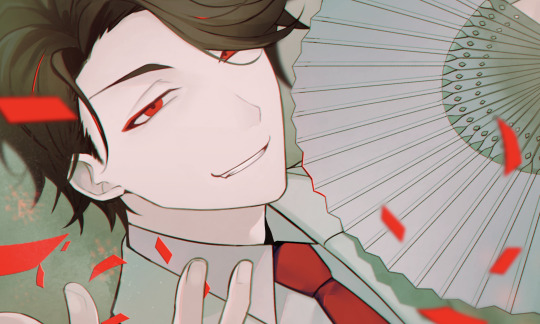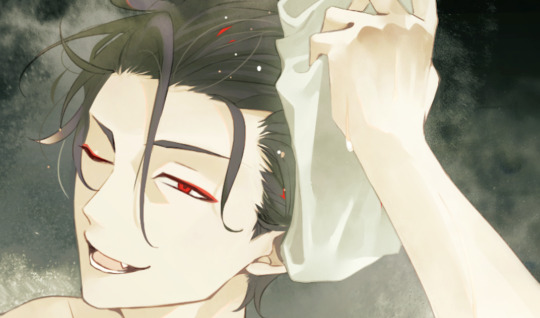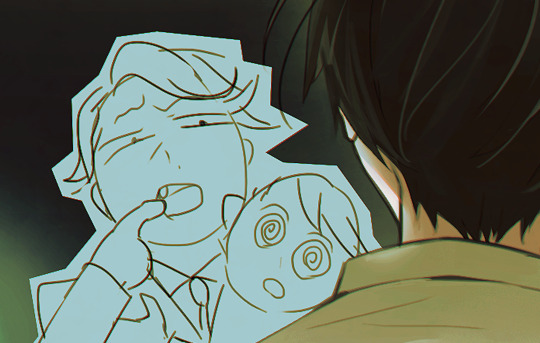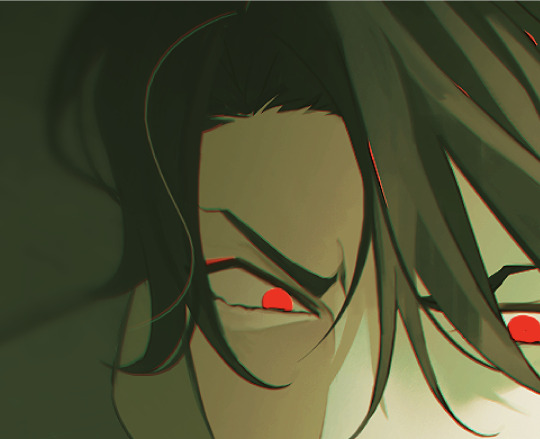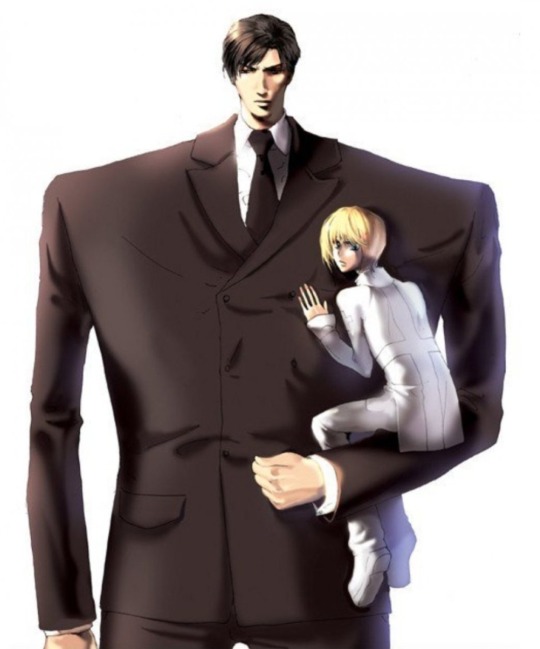Don't wanna be here? Send us removal request.
Text
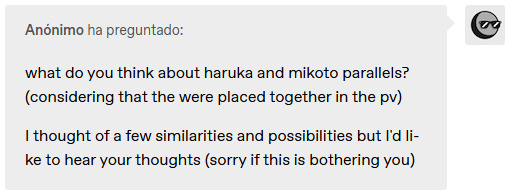
(Replied as a new post to avoid the character limit)
It doesn't bother me at all! This sort of question is something I've been turning over for quite a while, actually. I tried to make a post pointing out comparisons between non-paired prisoners, because I feel like people focus too much on number pairs without considering other thematic parallels, even with Milgram pointing some out (Eg: Shidou-Amane, Fuuta-Kotoko, Haruka-Muu, Yuno-Kazui). It stalled around Muu though, because it turns out that's a whole lot of entries, and also I wasn't sure that people would be interested in a post that's dozen of paragraphs long (though still much less elaborate than this post, of course).
Personally, I think Mikoto and Haruka have a lot in common and share many themes, but I hardly ever see it brought up. Some of it, I think, is the fact that Haruka's trauma gets a lot of focus while Mikoto's mostly implied, so there's a lot of people who don't look beneath the surface. So they just get slotted in the boxes of "sympathetic" and "unsympathetic", meaning fans miss the similarities even when it's them doing literally the same thing (Like trying to kill Es to protect their self-worth).
But at the end of the day, we have two people extremely afraid yet dependent on other people's opnions of them, whose every interaction is shadowed by the after-effects of their early-childhood trauma in a way that seems "cute" or harmless at first but really isn't, who committed premeditated murder because they saw it as the only way to make their lives bearable, who have artistic inclinations but can't find the self-confidence to pursue them, who are dealing with mental illnesses they have no (healthy) frame of reference for, who are okay with being used and abused (even physically!) so long as people approve of them...
Well, I don't want to drop the entire essay on the intro part. Onto the first section!
(I didn't particularly mean to organize it like that, but the two sections basically came out as Bokukoto- and Orekoto-centered, respectively. Funny how it worked out.)
Children and adults.
What are Haruka's goals? To be loved and cared for, even if it means taking on a subordinate role. To have his weakness acknowledged yet not be shamed for it, to be have his strengths bring joy to those he loves yet not have people ask more of him than he can give.
What are Mikoto's goals? To be a good, responsible, capable person and have people acknowledge him as such. To have his efforts rewarded, even if it means overexerting himself. To find conventional success and prove to those he loves (his mom, in particular) that they needn't worry for him.
In other words, Haruka wants to be a kid, Mikoto wants to be an adult. Haruka wants to be protected, Mikoto wants to be admired.
Why this difference? Well, I see two possiblities. One, Haruka has a golden past to retreat to, a time when he felt loved and safe. Mikoto might not have had that, or he might not remember it: after all, DID forms from trauma very early in childhood, as early as 5 years old and generally no later than 10. And of course dissociation itself tends to make remembering difficult, even before actual alters get involved.
So, Mikoto most likely doesn't remember any 'good old days' he could yearn for, either because he was extremely young or because they never existed. His only option, then, is to place his hopes on the future.
The second thing is that, in spite of Mikoto most likely having earlier trauma, Haruka is far more obvious in his dysfunction. Pretty much every person he meets will at least walk away with the feeling he's kind of weird, if not worse. This only manages to reinforce his feelings that he's inferior to everyone else, and that that's an inescapable part of his being.
Meanwhile, Mikoto can trudge through life well enough to believe that achieving what he wants is within his reach, even to be expected. Surely if he works both hard and smart, he can accomplish his goals without problem. He can get a good career if he just focuses on what he's good at, choosing 'efficiency' over his interests. And he can get everyone to like him, if he just remembers to always, always be nice to them, no matter how much he'd rather not. Then he'll reap the reward of succeeding at life!
That's just how things work, right? You put in the effort to treat others well, and your reward for doing so is to have other people do the same for you. That's the basis of society! And that's also how Mikoto makes himself feel safe. If his own actions determine other people's actions, then he can stop bad things from happening to him by just not doing anything that would invite punishment. Everyone knows monsters only eat the misbehaving kids! Just follow the rules and everything will be fine.
(That's another big difference between Mikoto and Haruka: Haruka knows he can't do what's expected of him, so by the start of Milgram he's pretty much given up on the idea of ever being accepted or sucessful. Mikoto does believe he can cut it, but that brings its own kind of helplessness: he can never stop striving with all his might, because if he ever does fall short his self-esteem will crumble to pieces.)
The trouble is, sometimes even when you do follow the rules, other people just... refuse to reciprocate. Why is that? Did you do something wrong? Well, you can't exactly go up to them and ask. Now that would certainly be a faux pas! Clearly the only choice is to figure it out yourself by ruminating on it. All night long. Hey, remember when Mikoto said that he wouldn't be able to sleep if Kotoko didn't wish him a happy birthday? Sure sounds like somebody who worries a normal amount about gestures that might possibly be snubs.
But another convo I'd like to bring up is one with Fuuta, where Mikoto shows up unprovoked to tell Fuuta that being upset about being kidnapped is dumb and childish and will get him nowhere in life, and anyways he's just doing it for attention.
This seems a bit OOC, doesn't it? Mikoto basically never criticizes anybody. When Yuno basically calls him fake to his face, he just laughs and calls her a straight shooter. When Haruka said that he's been avoiding Mikoto because he's scary, he just shrugs and goes, that's fair, I'd have done the same. Hell, even knowing that Kotoko tried to beat him half to death, he still goes to congratulate her on her birthday. So what did Fuuta say that was so much worse than all of those?
The problem, really, isn't what Fuuta said or did to Mikoto, but how Fuuta behaves with everyone. Mikoto can put up with being openly disliked; see his interactions with Kotoko. But seeing somebody so brazenly ignore the rules he's based his life around, now that affects him a way that goes beyond Mikoto as a person.
If you asked Mikoto, he'd probably say that it's because he's sad to see somebody younger than him waste his potential with such stupid, meaningless stubborness. But really, it comes back to the fact that "nothing bad will happen as long as you behave" is one of pillar's of Mikoto's life. So how is he supposed to handle seeing somebody misbehave constantly, repeteadly, and still do just as well as him? What's that supposed to mean? Do things not actually work that way? Was he just being taken advantage of? That can't be. If being nice doesn't ensure that you'll get treated well, what does? He endured so much pain because it was supposed to pay off someday.Were all his efforts so far just make-believe, a kid hiding under the blankets thinking it'll do anything?
No, no, no. It's the others who are wrong. All his suffering until now was meaningful and helpful. He knows what he must do and he's not going to stray from the right path. Those who do are just bringing punishment down onto themselves. And while he's not capable of consciously acknowledging his anger, he can always try to share some "friendly advice" about what happens to those who fight against forces greater than themselves. You can't win those battles. He never won, so of course you can't win them. Stop struggling, it's for your own good.
(Amane-Mikoto parallels? In my Haruka-Mikoto parallels post? It's more likely than you think!)
Saviors and weaklings
You might be thinking that the title says it all, really. Haruka is a weakling, Orekoto is a savior, those are opposites, the end.
Well, yes, but it's not quite that simple.
Haruka in the second trial has also taken on a protector role towards Muu. This is a fairly uncontroversial reading, so let's go take a closer look at their similarities:
-Both Haruka and Orekoto put emphasis on Es not scaring/stressing their charge any further.
-In both cases, what they're looking for is acknowledgement from the one they're protecting and a sense of being useful ("Rely on me, praise me with your song, I am your savior")
-Haruka says that Muu is the reason why he can be who he is now. The same could be said for Bokukoto and Orekoto: without the latter, the former would not be able to remain his current self.
-At the same time, the 'saviors' need their charges, just as if not more than the other way around. Haruka's life has revolved around the concept of mothers since basically forever, and we literally don't know a single thing about Orekoto outside of his role. Honestly, considering he only seems to come out during stressful situations, it's possible even he doesn't know who he is outside of being Mikoto's savior.
Even the structures of Metamorphosis of the Weak and John Doe are similar. Consider:
-The interrogation starts with the prisoner being fairly unthreatening. Mikoto is rather nervous at the start, but as soon as Es starts pretending to entertain the idea that he really hasn't committed any murders, he calms down significantly. -The prisoners feel safe thanks to Es' temporary affirmation, but this is soon swept away by Es themselves. Even as the prisoners become more and more obviously distressed, Es presses on dispassionately.
-Eventually, they become totally overwhelmed by emotion and attempt to kill Es. Haruka is stopped by Milgram's rules, Orekoto isn't.
-At this point, a different prisoner makes their appearance, whether physically or just in conversation, and the rest of the drama revolves around them. In John Doe it's of course Kotoko fighting off Mikoto, after which he's literally unconscious for the rest of the VD (except for one line), and instead the remaining time is dedicated to Kotoko and her deal.
For Metamorphosis, it's when Haruka proclaims that Muu is his real mom and starts talking about their relationship. In both cases, there's a clear shift in focus from the OG character themselves to how their actions would affect Milgram overall (Kotoko offering to stop Mikoto if he attacks again, Haruka threatening suicide).
Well, we can probably agree that Haruka is a savior of a sort. But can we close the circle and bring the comparison back around? Is Orekoto also a weakling of a sort?
To answer this, we'll need to define weakness. For this, I'll actually refer not to Haruka's voice drama's, but to Muu's. Namely, this part in Queen B:
"Es: (…) One-sided violence and mistreatment… I’m sure it was difficult to handle. It’s not unreasonable to come to the conclusion that murder is the only way for a weak person to get out of that. That’s exactly why I forgave you." Muu: Yeah… If I hadn’t done that, I could have died some day."
We hear Haruka argue something similar after Es tears him down, asking "So what should I have done!? Was I supposed to give up on myself too!?" So we could say that a weak person is somebody who's trapped by their circumstances, somebody with the deck stacked so far against them that they have no choice but to take extreme measures.
I think that's pretty much how Orekoto views his own situation. Looking at his parts of MeMe, most of the what-if sentences basically come down to "I don't want to do this, but I can't not do it either". We also have lyrics like "It’s like what’s wrong isn’t wrong" and "Is this selfish?", showing that Orekoto is also full of self-doubt about this being the right thing, but doesn't see any other choice. After all, "Hurting it, holding it down, it doesn’t change anything, does it? Ahhh, It’s the same anywhere I go".
Like Haruka, nothing he tries seems to work and he's desperately trying to survive in any way he can. Whether this "death" is on a purely emotional level or if, like Muu, it's hinting at suicide ("Maybe it’s ok to try to keep on living"), he needs to get away. It doesn't matter anymore if it's "good", so long as it works.
Of course, I'm sure Orekoto wouldn't take well to the idea that he's weak. His breakdown in John Doe was, of course, because of Es pushing Bokukoto, but his rant was almost entirely focused on how weak and pathetic Es was. It seems that in that he resembles Fuuta (who was, after all, the first prisoner to try violence): when he's scared, he tries to intimidate the threat to feel safer.
(Of course, there's something to be said for Haruka also despising his own weakness, even if his reaction to it is to worship others for being different rather than project this hatred onto them.)
(And while we're in the topic of Fuuta, it's worth noting that he's also part of the overall protector theme spanning several characters. He even relates to Haruka and Mikoto directly, in that those two are the ones he picked as "weak" people he needed to look out for)
Muu and Haruka, even before the second trial, they were both weaklings and saviors of the weak (themselves). But this doesn't apply to Mikoto, because the roles are split between the alters. There's a clear separation between the 'good', pitiable, socially acceptable Bokukoto and the 'bad' and violent Orekoto. And you know where else we see something like this? Haruka's MVs.
This is most obvious in Weakness, where the separation is at its starkest, to the point where many people didn't think Haruka's younger self was him at all. Basically, every bad thing in the video is attributed to older Haruka. Li'l Haruka plays happily with his maybe-sister, older Haruka attacks her. Li'l Haruka pets his dog while his mom smiles by his side, until older Haruka bashes its skull in. And of course, in the end older Haruka is so consumed by hatred that he chokes his terrified younger self to death. Not the first time he attacks him(self) either; back at almost the start, older Haruka shoves him into a crayon puddle, with the camera making sure to show kid Haruka's terrified expression and Haruka's cold glare.
(I want to point out the dog scene in particular. Specifically, how the younger Haruka is horrified to find blood on his hands even though he never actually laid hands on the dog. This is quite reminiscent of the scene in MeMe where Mikoto becomes afraid of his reflection's evil expression and falls backwards, only to have the devil card fall on him and corrupt all the water into blood. But an interesting difference is how, while Mikoto not remembering is just a literal retelling of events, the same shouldn't apply to Haruka. And if the girl is the same age in AKAA and in Weakness, suggested by the fact she's dressed the same in both, then she couldn't have been playing with same-age Haruka either.)
In AKAA this divide into a good, young Haruka and a bad, older Haruka is less stark, presumably because after a forgiven verdict Haruka feels less disconnected from his past as a 'good kid'. It's not gone, however. We do see his younger self kill fish and a butterfly, but the harder-hitting murders of the dog (and possibly the girl, it's hard to tell) are left to his 17-years-old self. Not to mention the sequence when his mother opens the door, which is probably the part where Haruka is framed in the most threatening way across the entire MV. That too shows us only the current Haruka, notable because just seconds before it kept switching between the two of them.
At the same time, there's also a disconnect in Weakness between current Haruka and his murders. When we see him killing somebody he actually killed in real life (that is, the girl and the dog), it's followed shortly by him waking up in his bed, framing it all as just a dream. This is very similar to how in MeMe the second scene shows Orekoto killing somebody, with the third starting with Bokukoto gently waking up, completely unaware. There's of course also the line "I’m probably just having a bad dream, I need to wake up soon", which only drives it further home.
Well, I think that wraps up my points. To TL;DR it, some themes to consider are: fixated on past/fixated on future, giving up/trying too hard, dependence on others, wanting to feel useful, black and white thinking re: oneself and viewpoints warped by childhood trauma.
For a bit of extra fun, I'd like to note some shared visual motifs between MeMe, Weakness and All-Knowing and All Agony. There won't be much meaning analysis from me here, so feel free to supply your own.
Music Videos
(Some of the screenshots repeat, that's intentional)
Surrounded by eyes: Most obvious in Weakness, but the Hanged Man in Mikoto's shirt (and less obviously, the Magician) also show something similar.
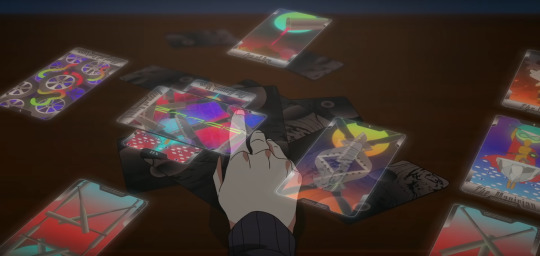
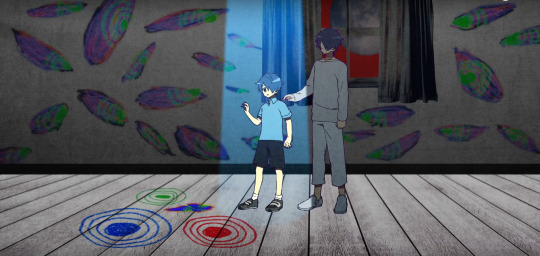
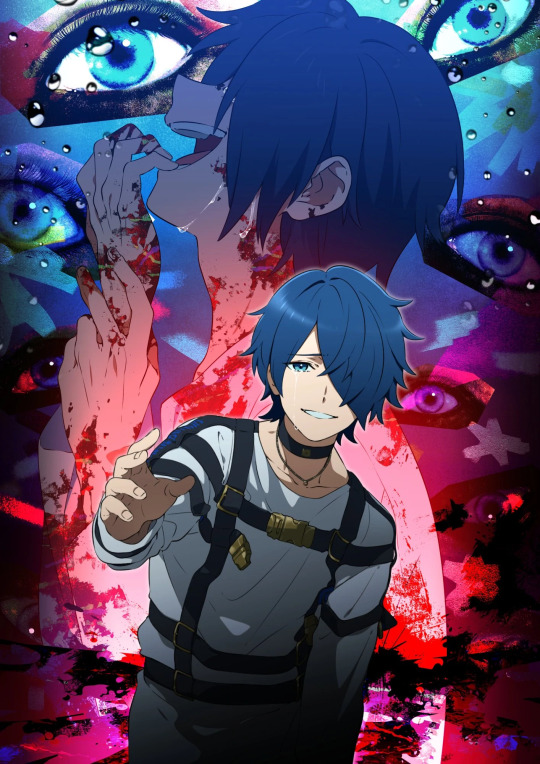

Water turning into blood: This one is somewhat dificult to show in still screenshots, but it's present in both MeMe, Weakness (when one of Haruka's teardrops fall onto the water) and arguably AKAA as well.
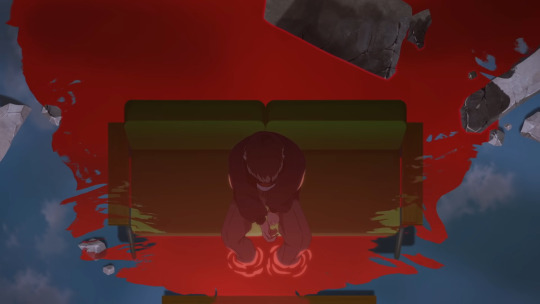

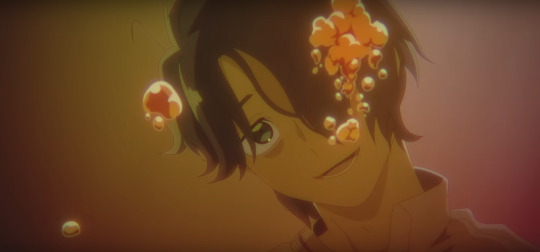
Red skies with a moon visible: Interestingly, this one seems to be associated with younger Haruka in Weakness (most obvious at the very start, when he and older Haruka switch rapidly, with the scene outside the window also changing). There's one very obvious moon in a red sky near the end of MeMe, but there might be another one shown in the Fool card. Lots of Mikoto's cards show circles in the upper corner of the cards (but interestingly in the Hanged Man it's at the bottom, near their head, like an halo). Whether we can consider them all moons is up to speculation, but few of them match the color scheme anyways. Speaking of which, while Weakness almost always uses grey/blue moons with red skies, there are two exceptions: when Haruka is shown killing the dog (blue sky, red moon) and in a piece of official art that shows a red moon on a red sky.


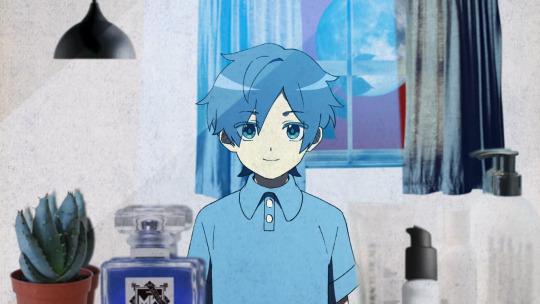



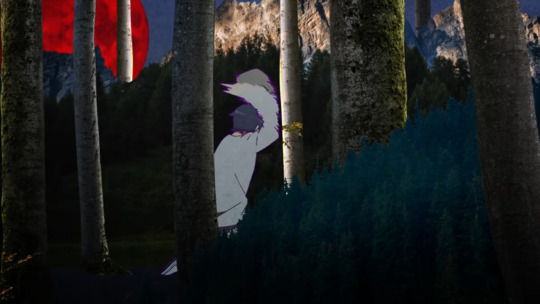
Confusion between indoors and outdoors: If you notice, literally everything in Weakness happens indoors, except for the bits where Haruka is floating in water. Even the forest has floorboards, except for a single scene. The opposite also happens: we see kid Haruka out for a walk with his mom, but they're still inside the house, with the city just being images on the wall. Meanwhile, the mindscape in MeMe shows a ruin (no walls) on an endlessly extending sea and sky (natural-ish settings), but it also reflects the structure of Mikoto's house. So is it inside or outside? Looking at the shoes, both Mikoto and younger Haruka are dressed as though they're outside, but older Haruka is wearing slippers.





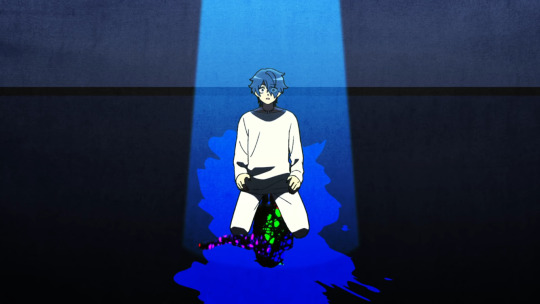
Reflections not matching "reality": Note how neither Mikoto nor the coffee table show up in the water in the second image, or how the paintings go from having no reflection to having each other's reflection, with those facing the wrong way. The fourth and fifth images are also an interesting example of the reflections not even matching each other, even though the timing and framing suggest we're still looking at the same scene.

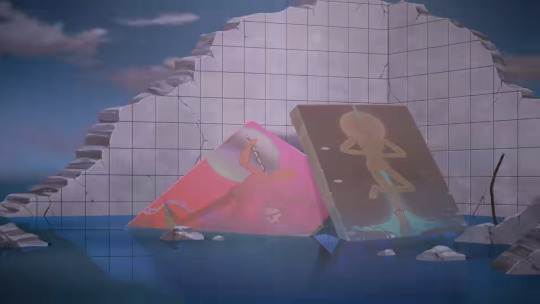

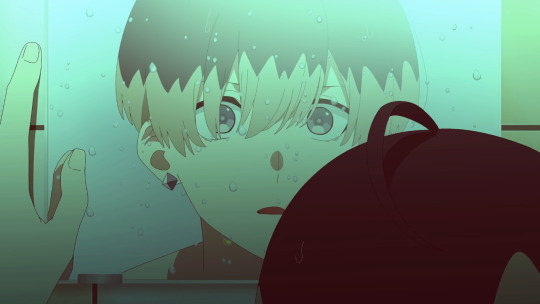
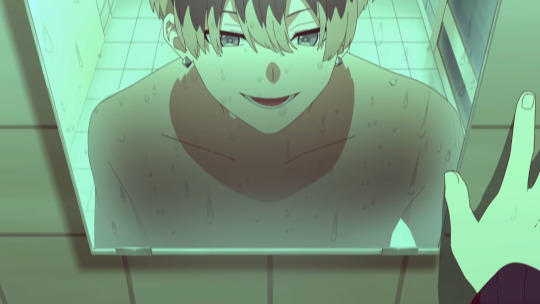

105 notes
·
View notes
Text
Started out as practicing hair animation for a different project but ended up being a small project of its own 😅
2 notes
·
View notes
Text
Two in Six Billion - By Denzou (9/10)
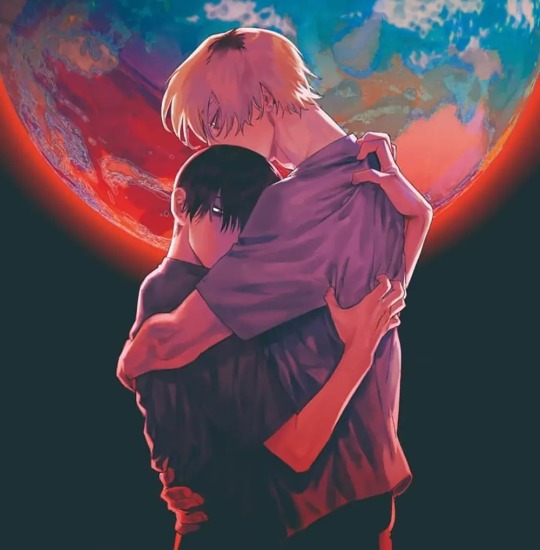
Yanderes are trendy. They have been for a while. There are lots of stories about raising yanderes, and taming them. It's all so convenient. The object of affection is usually strong enough to do the taming, or weak enough to enjoy being watched. What about the in-between? What about real hatred? What if you made your bully fall in love with you by accident, and your entire life became a single room as a result?
Katou wants it to end. He's not talented. He's regular looking. He's shy. He could have made it through school, so he got targeted by bullies.

The boy who made him a target, Oda, doesn't even know his name. That's what hurts the most. Oda is popular, handsome, rich, and rude. He snaps at Katou once, and that's it. The shy boy spends his high school life alone.
The bullying makes him end his life.
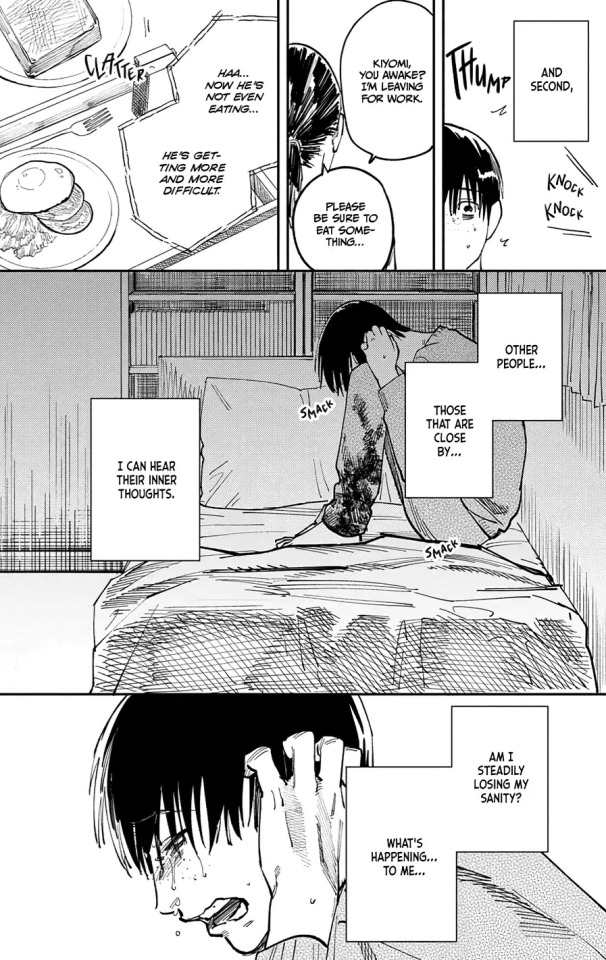
He wakes up again, full of memories and hate. He doesn't go back to school. He tries to end his life again. He starts to hear other people's thoughts. The noise makes it impossible to function. He has no life outside of his room. His parents genuinely seem to love him, but even they are frustrated.
He can't die, and now he knows how the world sees him.
It's...brutal. He's a depressed kid and he gets treated like trash for looking and acting that way.
He feels like a monster.
An alien.
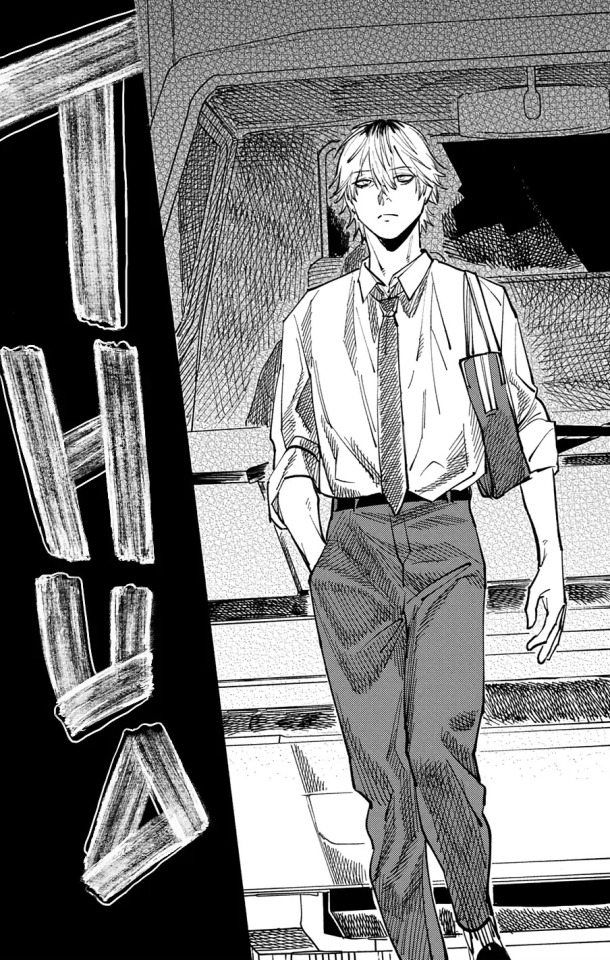
Katou sees Oda.
He wants the perfect young man dead.
A truck hits Oda.
He doesn't die.
Oda awakens with the same power to read minds.
It drives him crazy.

Katou visits out of guilt. Oda screams with joy. He wants to be best friends. He wants Katou around every day. Katou is like a protective barrier. He can't hear the awful things people think about him in Katous holy presence.

Oda has been served the ultimate punishment. His friends and casual girlfriends visit. He hears their thoughts. They're jealous of him. They don't like him at all. He can no longer deny how alone he is. His rich mom sees him as a burden too. She thinks her only son's stay in the hospital is pointless and overpriced...even though he literally got hit by a truck.
Oda is handsome, rich and smart.
But.
He has never been loved.

He acts submissive at first. He begs Katou for his friendship. He suspects Katou is also special, but something is wrong. Katou's powers are getting weaker, and his powers are getting stronger.
He starts to need Katou more and more.
Furthermore, he's happy.
Being with Katou makes him want to be kind.
Oh.
Also he doesn't remember Katou.
He doesn't remember the boy that got bullied because of him. Back then Oda didn't even register his face.
Now, Katous face is his favorite.

The L word comes up pretty fast. Oda's devotion is religious. He wants to live with Katou and support him like he's an idol. He also stalks Katou. Katou doesn't want his love, but Oda follows him home.
A loving mother lets her sons first ever friend in.
That friend does horrible things to her son.
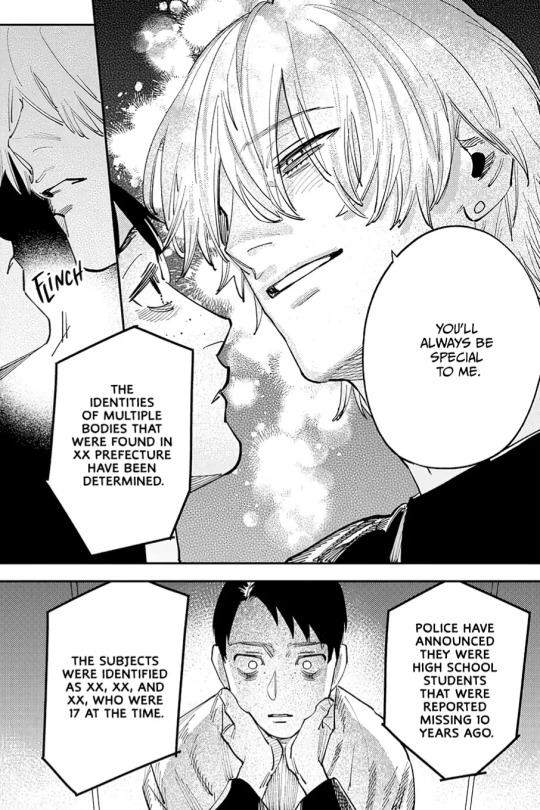
Five years go by. Katou is still a holy halo....but he doesn't have his powers. Katou thinks Oda doesn't know, but he does. He loves Katou truly. Deeply. He has never loved anyone else in this life. Hearing Katou's thoughts actually makes him happy. He wants to know everything about the love that saved him from his lonely existence.
He buys a collar for Katou.
He kills Katou's mother.
Katou isn't allowed to leave their expensive apartment.
Oda kills those bullies from five years ago.
There's only implications. Oda is smart. Capable enough to live without his parents. He's probably not a contract killer. He's alot more sinister.
He only kills people that Katou feels attached to.
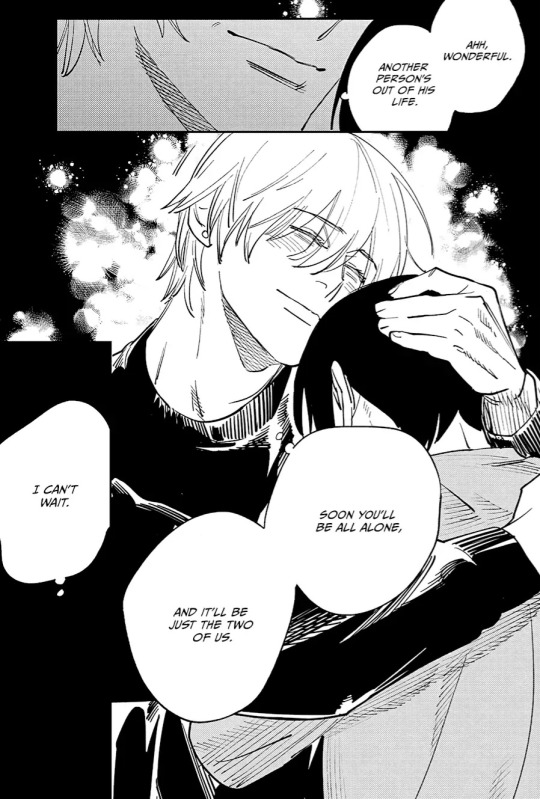
He wants to be the only thing Katou remembers. It's sort of a happy ending. They are in mutual love. The bullies are gone. Oda left his abusive parents behind.
Real shame about Katou's parents though, and everyone else he has ever spoken to.
272 notes
·
View notes
Text


I’ve had this idea in my mind for far too long but that one scene in chibi vampire except Sweet Pool 😂 I’m so sorry
15 notes
·
View notes
Photo






I posted these analyses on twitter before and am putting them back here for my own records! Slow Damage art and flower meanings… Credits to oomf bogparasite for helping me identify the flowers in Towa’s White Day art, and credits to a random JP slow damage fan for tweeting about the kochia meaning and making me jisho the fuck out of what they said
257 notes
·
View notes
Text
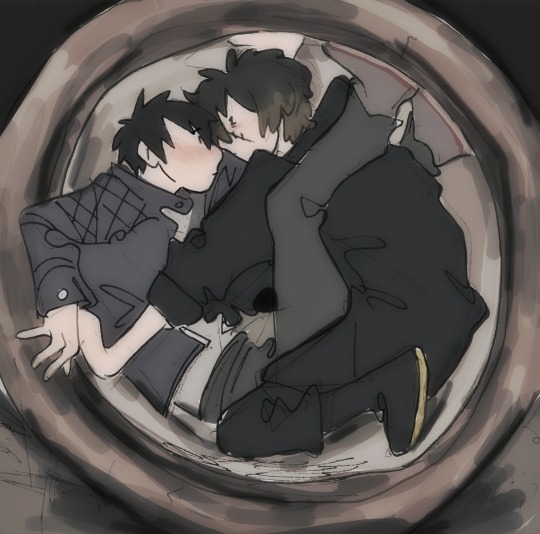
fujitowa in the concrete tunnel what will they do 😳💘
355 notes
·
View notes
Text
17 notes
·
View notes
Text
chiral games are like: here's a guy with issues. he has problems. he lives in a town that's not the greatest where a lot of the youths pass time by punching each other in a run down alleyway. here's the saddest wet dog of a man. you will fall in love with him. give me 25$. Most if not all of these characters will experience more trauma in two days than you could ever imagine.
519 notes
·
View notes
Text
Looking for sunshine (Kawase/Tamamori SS)
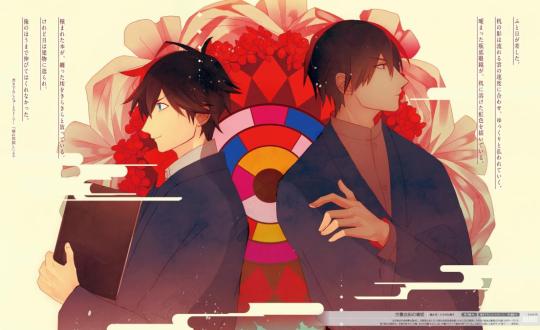
I’m forever a slave of these two This time another SS and even a little longer I also have to excuse myself if it sounds weird but that’s sadly how Kurosawa wrote it and I can’t do anything about it. Shout out to my lovely editor who had to deal with this mess. Enjoy~
Keep reading
119 notes
·
View notes
Text
Kawase’s dream (Kawase/Tamamori SS)
I’m dropping the next Kawatama SS translation, this time it’s a 2 parts story. It’s rather short, enjoy~
Keep reading
38 notes
·
View notes
Text
Elapsed love (Kawase/Tamamori SS)

Happy Birthday Kawase <3 My bitrthday present for you is the translation of the weirdest short story Kurosawa ever wrote. Dont be deceived by the title it has nothing to do with the content of this ss. I’m not sure what the point of this story was but enjoy I guess?
Keep reading
59 notes
·
View notes
Text
Machine translation tools for Japanese visual novels (2022)
Hi! Today I wanted to share some useful translations tools I have been using to play Japanese visual novels. I found many other guides, but many of them were published over 8 years ago and seemed a little bit outdated. Therefore I thought it would be a good idea to share some of the tools I have been using in the past two years. I have only used them for BL visual novels so far, but they have all been working pretty well! These days we are lucky to get official English releases of visual novels and I recommend supporting these, but there are a lot of games that have not been translated yet.
Machine translation might not be perfect, but it has definitely improved a lot within the past couple of years and it gives people the opportunity to play these untranslated games.
Keep reading
64 notes
·
View notes
Text
UuultraC After Story List
Adelta’s second game UuultraC recently got released in English, so I wanted to create a list with all of the free extra content that’s currently available on Adelta’s website! Make sure to only read these short stories after finishing the routes, otherwise they might not make much sense or even spoil the game’s story. They’re written in Japanese, but not extremely difficult to understand with translation tools.
> Short story 1 (Kozuka Akira x Kagome Shoutarou) One day when we wanted to go swimming, the town was flooded by a sudden heavy rain. A sweet early summer story.
> Short story 2 Continuation of short story 1 Side A: Akira’s point of view Side B: Shoutarou’s point of view
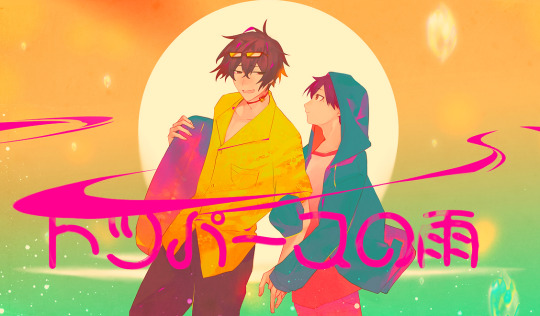
> Short story 3 (Isshiki Suzu x Choutsugai Shirou) On a tropical night when the moonlight is dazzling, something happens to the body of the citizens of Tokyo. A story about midsummer.
> Short story 4 Continuation of short story 3 Side A: Shirou’s point of view Side B: Isshiki’s point of view

> Short story 5 (Hibarino Yomi x Sayashi Juurou) After spending their time peacefully, it seems like Yomi has found a new “hobby”. A story about an alien and the end of summer.
> Short story 6 Continuation of short story 5 Side A: Juurou’s point of view Side B: Yomi’s point of view
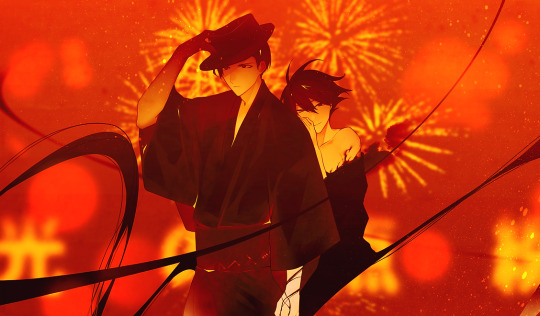
All credit goes to Adelta for creating these wonderful stories and beautiful art! Japanese page can be found here: https://adeltaz1.wixsite.com/uuultrac/%E8%A4%87%E8%A3%BD-%E5%88%B6%E4%BD%9C
134 notes
·
View notes
